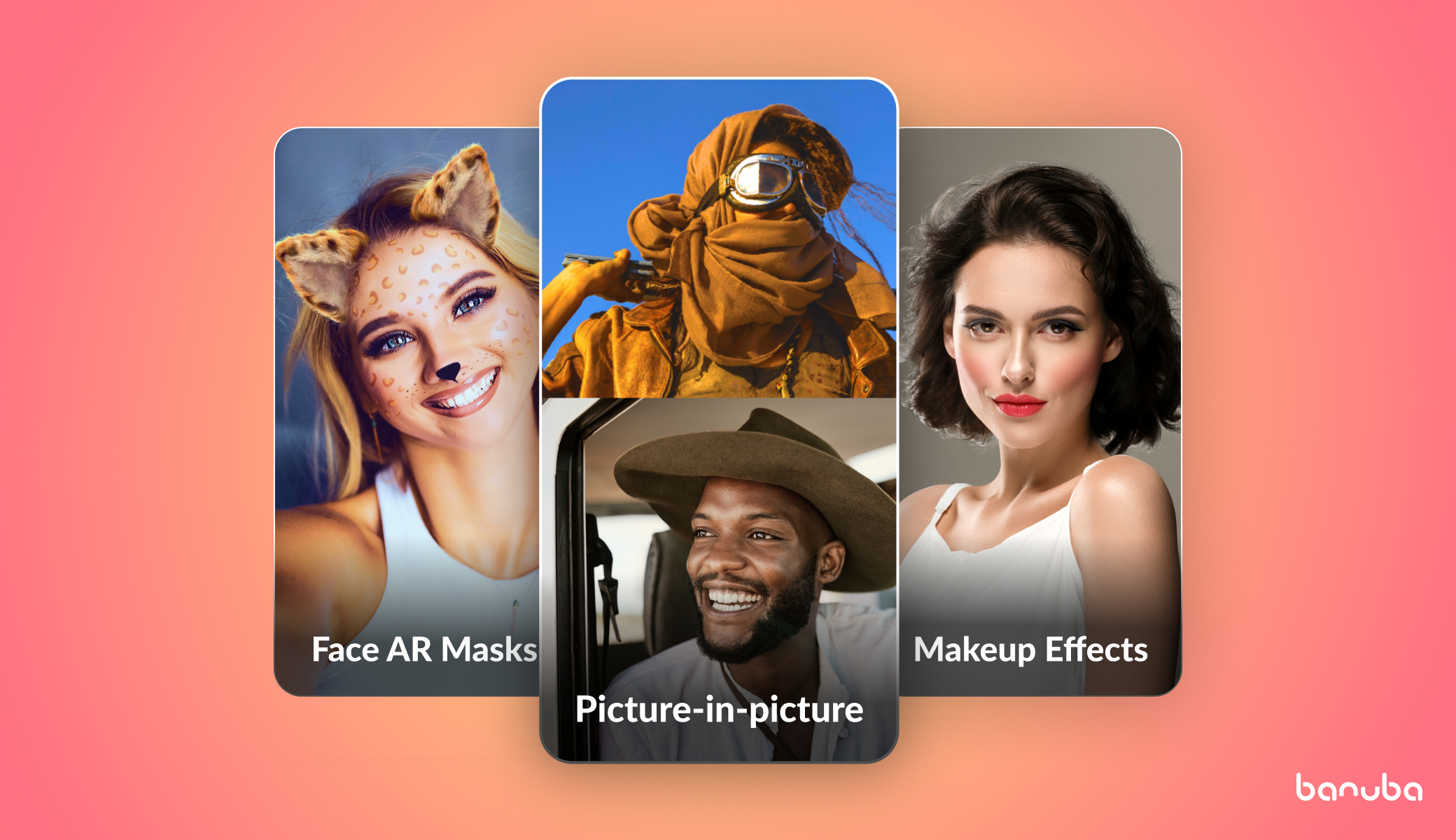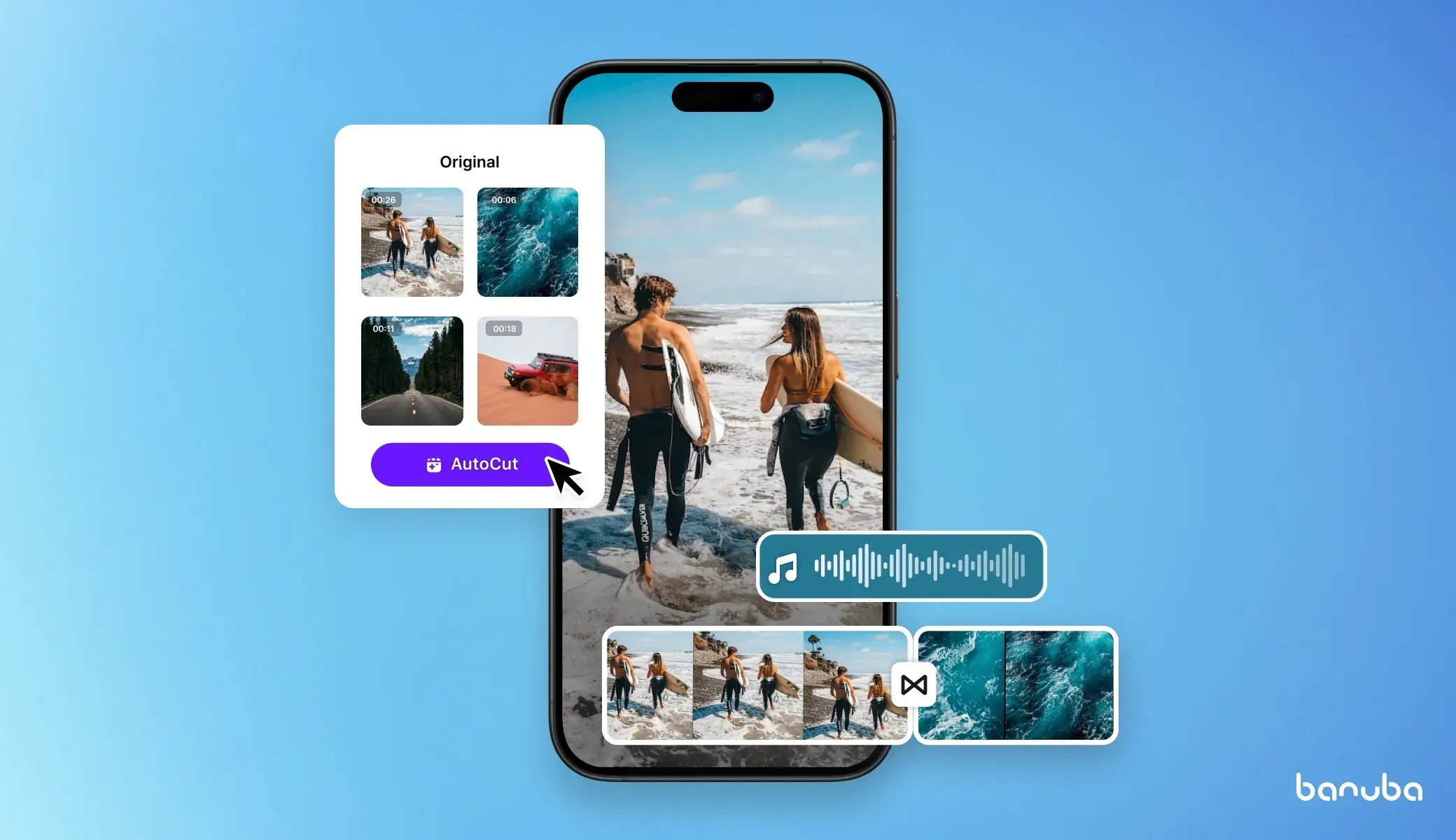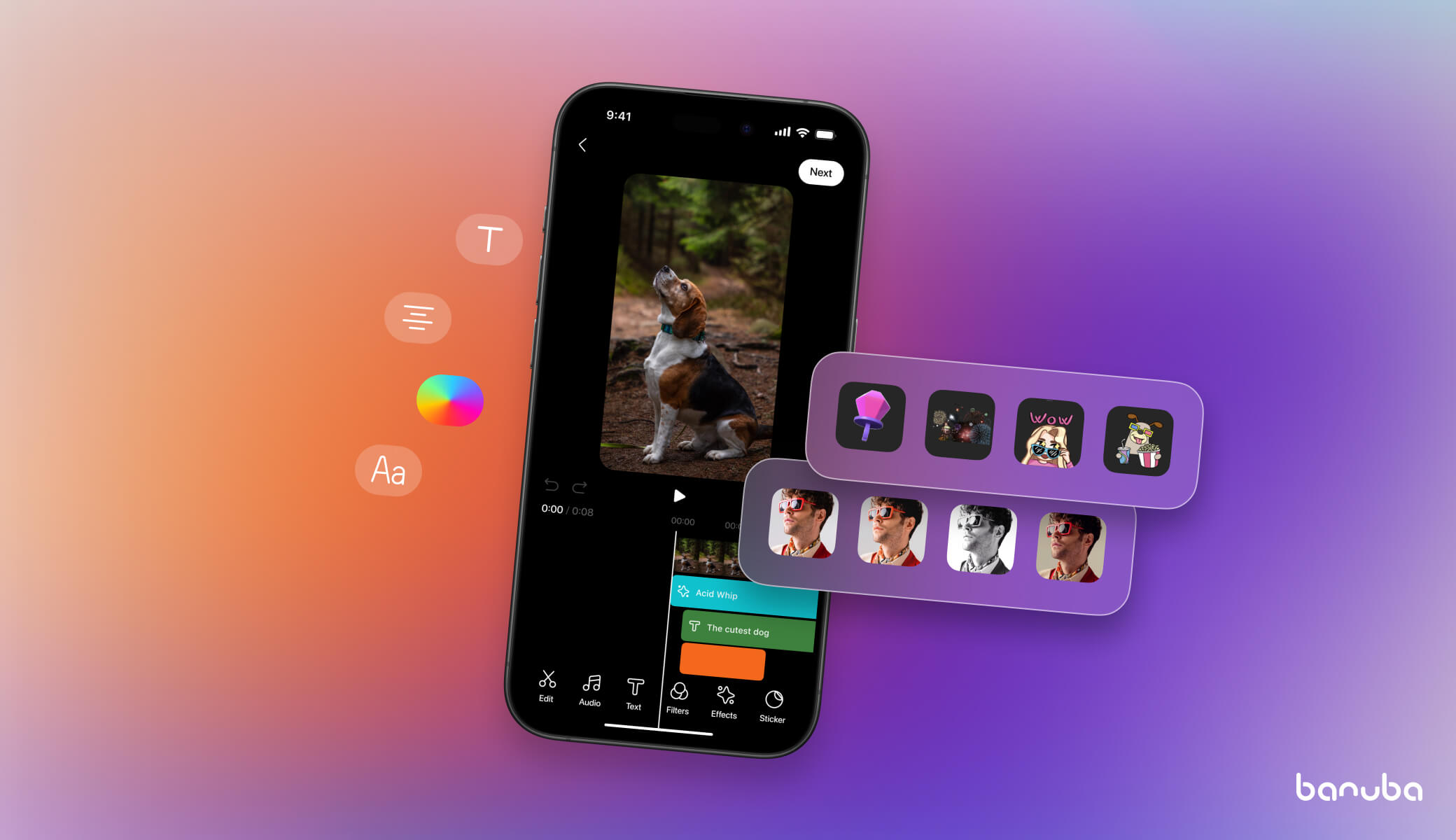[navigation]
TL;DR
- Most popular social media platforms offer APIs
- Other APIs are software products that enable quick integration of certain features
- Developers looking to connect to social media could face complicated approvals or confusing documentation.
1. Banuba Video Editor API
Banuba Video Editor SDK is a full-fledged audiovisual content creation suite that usually takes under an hour to install. And it includes:
- Video recording
- Trimming/merging
- Transition effects
- 3D masks
- Background changer
- Rapid/slo-mo
- Picture-in-picture
- Color filters
- Beauty filters
- Music provider integration
- Etc.
 Transition effects
Transition effects
It also has an API version, which has fewer premade UI elements but offers more flexibility and customization. This product is tailored to making short video-focused apps like TikTok and can potentially save up to 50% of development time when creating one.
Don’t hesitate to fill in the form and request a 14-day free trial.

2. TikTok API
The most successful social network offers not one social media API but several, so that other developers could integrate only the features they need. These include:
- Login kit (sign in using TikTok credentials)
- Share kit (post to TikTok from a third party app)
- Content posting (similar to the one above, but compatible with web apps)
- Embed videos
- Display (connect TikTok profile and show videos)
- Research (gives access to pubic data)
- Commercial content (allows getting information about ads and advertisers)
- Data portability (transfer user information from TikTok to another app – available for EU only)
While this collection offers access to many features, outdated documentation often makes implementation difficult. Moreover, with the recent legal troubles that TikTok faces in the USA, the future of the apps using these APIs is unclear.
3. Facebook API
Facebook, being one of the oldest successful social networks, has a large and detailed API with dozens of functions:
- Posting/Crossposting
- Slideshow creation
- Ad creation
- Getting statistics
- Reels publishing
- Music recommendations for videos and Reels
- Stories publishing
- A/B testing
- Etc.
The documentation is expansive. It can be hard to navigate at first, but it is updated and accurate. The hardest part is getting approved for the access you need, as Facebook admins take this matter very seriously. You will need to request only the access required for your project to function, as well as pass the business verification process. Minor mistakes at this stage could be grounds for refusal, so bureaucratic issues present a bigger challenge than coding.

4. Instagram
This social network is owned by Meta and shares its developer portal – and the approval process. Its feature set is not as large, though:
- Messaging
- Collaborative posting
- Publishing in feed and stories
- Logging in through Facebook
- Embedding
- Business login
The hardest part, as with the previous social media API, is getting through a stringent approval process. Also, the examples are centered around PHP, and developers using other languages will have to improvise.
5. LinkedIn
LinkedIn is a preeminent social network for professionals. Its API is mostly of interest to business apps focused on job hunting, professional brand development, and so on. This is what it allows you to do:
- OAuth login
- Compliance (communications recording, archiving, and review)
- Sharing on LinkedIn
- LinkedIn Learning access and interaction
- Ad campaign management
- Community management
- Analytics
- Job/candidate search
- Lead prospecting
- Etc.
LinkedIn also has a strict approval process, although not as confusing as the one for Facebook and Instagram. The token management would also take some work, as the tokens themselves refresh every 60 days.
6. Medium
Medium is a popular blog platform for individuals and companies alike. It can be used for promoting yourself, raising brand recognition, boosting SEO metrics, or simply sharing your thoughts with the readers. This is what it's API can do:
- Authentication
- Getting publication information
- Creating posts
- Uploading images
The main issue is that since 2023, Medium has deprecated its social media API. While it’s still there along with the documentation, implement it at your own risk.
7. Pinterest
Pinterest is popular among artists and people looking for visual inspiration. The convenient board system has helped it stay relevant to this day. Its API is now at version 5.x with the following features:
- Creating and managing pins
- Creating and managing boards
- Uploading media
- Follow/unfollow user
- Managing ad accounts
- Targeting
- Auctions
- Etc.
Like many other social media APIs, this one requires going through an approval process. Unlike the other cases, however, this one is much clearer and easier. Moreover, the documentation is mostly updated and has everything you need for quick implementation.

8. Reddit
Reddit is the leading platform for forums, where almost every hobby and interest is represented. Each subreddit is a self-governing community with its own rules and guidelines. Its API offers the following features:
- Get certain user information (karma, trophies, etc.)
- Managing collections
- Managing emojis & flairs
- Commenting and replying
- Following/unfollowing posts
- Managing notifications
- Etc.
Reddit’s API documentation is autogenerated. While it is always updated, it can also be confusing. However, the API itself is rather straightforward and clear, so developers rarely have serious trouble connecting with it.
9. Discord
Discord started out as a chat app for gamers. However, it has expanded, and is now used as a social platform to find like-minded people, manage customer communities, or even handle internal company communications. Discord APIs offer access to the following functionalities:
- Messaging
- Mentioning
- Sending images
- Uploading files
- Automoderation
- Managing voice chat
- Etc.
The Discord approval process is relatively simple and clear. The API itself is understandable and easy to work with, there aren’t many complaints about it.
10. Telegram
Another platform that started as a messenger, but grew to include dedicated channels, group chats, and more. It offers a powerful API with a lot of useful features:
- Authentication (including 2-factor and QR-code)
- Notifications
- Group management
- Forums
- Analytics
- Uploading/downloading files
- Encryption
- Etc.
Telegram API documentation is one of the best, judging by the developer opinions. The workflow is different from most cases, though, which can take time to adapt to.
Conclusion
Most popular platforms offer a social media API that third-party developers can connect to. However, this term is also used for a software module that contains premade functionality that you can integrate quickly and save development time. Banuba Video Editor API offers everything you need for TikTok-like content creation, so don’t hesitate to sign up for a free trial.





 Transition effects
Transition effects



